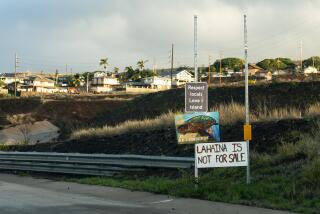Ex-Sailor Had Access to Naval Data in Terrorism Case
A former sailor on the U.S. destroyer Benfold had access to classified information on the ship’s movements that ended up with a website operator recently indicted on terrorism charges, according to the ship’s retired captain.
Capt. Mike Abrashoff said that Hassan Abujihaad had a secret clearance and a job on the ship that gave him access to the sensitive information, including when the vessel’s battle group would pass through the Strait of Hormuz on April 29, 2001.
U.S. officials have said the information ended up with Babar Ahmad, who was indicted by a federal grand jury in Connecticut last month on charges including conspiracy to provide material support to terrorists. Officials have identified Ahmad as a cousin of an Al Qaeda terrorist and have said that Abujihaad was in touch with Ahmad’s website by e-mail.
Abujihaad, a Muslim convert who now lives in Phoenix, has not been charged with a crime. Prosecutors initially said that a sailor they did not name had sent e-mails in 2000 and 2001 to a website run by Ahmad. Navy officials later identified Abujihaad, 25, as the sailor in question.
Prosecutors and Navy officials said no evidence currently ties Abujihaad to the illegal release of the classified information, which was found during a search of Ahmad’s home in London.
In August, in a statement issued through a spokeswoman, Abujihaad denied knowing Ahmad or mishandling classified information.
Abrashoff, the Benfold’s former skipper, said that Abujihaad’s security clearance and duties on the ship provided access to the information found with Ahmad. “I’m not saying that I believe he compromised the classified information. But Abujihaad had access to all that,” Abrashoff said in a recent interview from his Virginia home.
He also praised Abujihaad’s conduct as a sailor.
“I remember him so clearly because of his name. He was a pleasant kid and a good sailor,” Abrashoff said. “It was stunning to me that he was implicated in this. Nothing stands out from our conversations that would’ve alerted me that he was anti-U.S. If he left an impression, it was because he was quiet, respectful and an above-average sailor.”
Abujihaad was on active duty from 1998 to 2002, including 3 1/2 years aboard the Benfold, which he initially boarded as a 19-year-old enlistee.
Other former crew members, none willing to speak for attribution, recalled Abujihaad as an exemplary seaman. Abrashoff and Navy officials said Abujihaad’s rise to the rank of petty officer second class in under four years showed he was in good standing as a sailor.
A 33-page affidavit filed by Department of Homeland Security Special Agent Craig Bowling said Ahmad possessed a disk with classified information about the Benfold and other ships in its battle group.
The information detailed the battle group’s vulnerability to attack by small craft and included the formation the warships would use when the vessels steamed through the narrow Strait of Hormuz on the night of April 29, 2001. Ahmad was also told that the ships would be operating under complete radio silence.
Bowling’s affidavit said the computer file seized from Ahmad had last been modified on April 12, 2001. The investigator said the document pointed out that the battle group had “nothing to stop a small craft with rocket propelled grenades, etc., except their SEALs’ stinger missiles.”
Stinger missiles are normally used for defense against attacking aircraft, not surface ships.
“The document specifically notes that the battle group was tasked with enforcing sanctions against Iraq and conducting operations against Afghanistan and Al Qaeda,” Bowling’s affidavit said. The sender of the information asked Ahmad to “please destroy message.”
Abrashoff said that Abujihaad’s jobs as a quartermaster and signalman gave him access to navigational information and operational plans.
Abrashoff left the Benfold in January 1999, but fellow sailors confirmed that Abujihaad continued as a quartermaster through 2002.
Abujihaad was trained as a signalman to communicate with the fleet through the use of flags and a ship’s deck light that blinks messages in Morse code. But after reporting to the Benfold in July 1998, Abujihaad was cross-trained as a quartermaster, who assists in plotting courses, Abrashoff said.
In a July 2001 e-mail -- one of several allegedly exchanged between Abujihaad and Ahmad -- Abujihaad expressed “enmity towards the American enemies” and praised the terrorists who attacked the destroyer Cole in October 2000, killing 17 sailors and wounding 42, prosecutors said.
According to Bowling’s affidavit, Abujihaad also told Ahmad about a briefing given to the Benfold’s crew to prevent an attack like the one launched against the Cole. Bowling also wrote that Abujihaad voiced strong support for the “Mujahideen Feesabilillah [Way of Allah]” and commended “the men who have brought honor this week to the ummah [Muslim community] in the lands of Jihad Afghanistan, Bosnia, Chechnya, etc.”
Ahmad responded by encouraging Abujihaad to “keep up with the dawah and the psychological warefare [sic],” according to the affidavit. Dawah refers to Islamic missionary work.
Thomas Carson, a spokesman for the U.S. attorney’s office in Connecticut, declined to comment about Abujihaad or the case, except to say that federal agents are still investigating.
Abujihaad, now a postal worker, has admitted through a spokeswoman that he visited Ahmad’s radical Islamic Internet site but denied making anti-American statements. He also denied knowing that the website was linked to terrorism.
Authorities said Abujihaad exchanged e-mails with Ahmad through the latter’s Azzam Publications. According to U.S. officials, Azzam sponsored various pro-jihad sites via an Internet service provider in Connecticut, Nevada and outside the United States. Azzam also provided financial and material support to terrorists, including the Taliban, according to a federal indictment
Deedra Abboud, executive director of the Arizona chapter of the Council on American-Islamic Relations, acted briefly as Abujihaad’s spokeswoman when he sought the group’s assistance last month. She said Abujihaad visited Ahmad’s website to purchase educational materials about Islam and videotapes about the jihads in Bosnia and Chechnya.
In two brief meetings with a Los Angeles Times reporter, Abujihaad has refused to discuss the allegations against him.
His motive for communicating with Ahmad has not been fully explained, but it still bothers former ship captain Abrashoff. “We don’t check for political or religious ideology. We assume everybody on your side is on your side. If you have to look over your shoulder at your shipmate because you’re not sure whose side he’s on, it’s going to make your job exponentially tougher,” he said.
More to Read
Sign up for Essential California
The most important California stories and recommendations in your inbox every morning.
You may occasionally receive promotional content from the Los Angeles Times.










